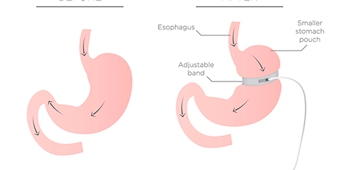
Bariatric surgery is commonly associated as a weight loss solution for people struggling with obesity or any other condition that has to do with body image or “shedding a few pounds”. This isn’t a wrong assumption, most bariatric patients do struggle with obesity, but this type of surgery also benefits people who suffer from other diseases, such as diabetes, sleep apnea, high cholesterol, and gastroparesis.
Some of the most popular weight loss procedures are the gastric bypass, the adjustable gastric band, and the gastric sleeve. These surgeries modify part of the patient’s gastrointestinal system by reducing the size of the stomach or bypassing a portion of the intestine, therefore altering the amount of food a person can ingest. This allows the patient to maintain a healthy weight and it can even improve their overall metabolism.
The different types of bariatric surgeries are constantly being refined and studied to improve the procedures and ensure that all operations are swift and with almost no risks for the patients. This also means that the new research has shed light on new ways on how to help people who struggle with other types of gastrointestinal diseases. Over the last few years, new studies have been published about how to treat patients with gastroparesis and medical researchers have found that the gastric sleeve can be a viable and helpful option for them.
Dr. Liza María Pompa González and our team at LIMARP®, located in Tijuana, MX, offer different treatment plans that meet the patient’s specific needs by going over your medical history to determine which weight loss surgery is best for you. The following article focuses on gastroparesis and how the gastric sleeve can help alleviate the symptoms this disease causes. We also invite you to contact us to book an appointment with one of our doctors if you wish to know more.
What is Gastroparesis?
Gastroparesis is a disease in which the stomach of a person cannot empty itself in a normal way because there’s a partial paralysis in the stomach caused by damaged nerves that don’t allow the muscles in the area to function properly. This slows the movement in the digestive system and some of the symptoms include nausea, vomiting, bloating, heartburn, and chronic abdominal pain.
So, what exactly causes gastroparesis? As it was mentioned before, this disease may be the result of nerve damage in the stomach, more specifically to the vagus nerve, but it can also be caused by a viral infection, complications from a gastric surgery, and the use of some medications like antidepressants. Hypothyroidism and other autoimmune diseases may also cause gastroparesis.
It’s common for people with long-term diabetes to also have gastroparesis and while it may also present itself in other situations, it’s usually misdiagnosed for an ulcer, an allergic reaction, or acid reflux. Although these symptoms may be considered as mild, it’s important to schedule an appointment with your doctor if they persist or become unmanageable. If gastroparesis goes undiagnosed, it can cause dehydration, malnutrition, an increase in stomach bacteria, high sugar levels, and stomach blockages.
To know if you have gastroparesis, your doctor may perform a physical examination and order blood tests. If you do have it, keep in mind that it’s not a curable disease, but there are treatments that can help you manage gastroparesis and reduce the problems that may come with it. Some patients benefit from medication that treats nausea or other drugs that help the stomach contract, while others may qualify for certain types of surgery such as the gastric electrical stimulation or the gastric bypass.
Now, what about the gastric sleeve? Is it a viable option for people struggling with gastroparesis?
The Gastric Sleeve: Is it Right to Treat Gastroparesis?
The gastric sleeve is a restrictive procedure that consists in reducing the size of the stomach by removing approximately 75% to 80% of it from the body, leaving only a small part that resembles a sleeve. By reducing the size of the stomach, the gastric sleeve only allows the ingestion of a certain amount of food, allowing the patient to reach or maintain a healthy weight. It also alleviates or improves conditions for people struggling with diabetes, sleep apnea, hypertension, and most recently, gastroparesis.
Aside from being one of the most effective and safest types of bariatric surgery, the gastric sleeve has shown to help with gastric emptying, which is one of the main struggles for patients with gastroparesis. It has also shown to reduce nausea and vomiting, in addition to improving the eating habits of people who have not seen results from other types of treatments. This means the quality of life and overall health of people with gastroparesis.
Contact Us to Learn More
If you have gastroparesis and want to know if the gastric sleeve is right for you, schedule an appointment with one of our doctors. We can help determine the right treatment for you. Contact us online anytime or give us a call at (619) 373-0229.


